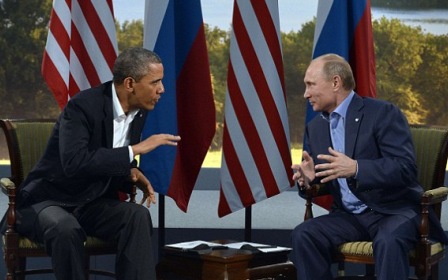Russian parliament gives Putin permission to use airforce in Syria: Reports

The upper chamber of the Russian parliament on Wednesday unanimously voted to gave President Vladimir Putin permission to use the country's airforce in Syria.
Under the Russian constitution, consent is required for the deployment of troops abroad, although head of the presidential administration Sergey Ivanov told media that no ground troops would be sent and that the operation would be limited to airstrikes.
The bombing would be carried out at the behest of the Syrian government. Russia says that Syrian President Bashar al-Assad had asked Moscow to step in, with Russian state channel Russia Today saying this made the intervention legal under international law, unlike the US-led anti-Islamic State airstrikes that began last year.
Ivanov added that Putin had decided to ask to deploy Russian planes due to the large number of Russian and former USSR nationals who had chosen to join the Islamic State group and now posed a grave threat to Russian national security.
“This is not about reaching for some foreign policy goals, satisfying ambitions, which our Western partners regularly accuse us of. It’s only about the national interest of the Russian Federation,” the official said.
“This morning, [Defence] Secretary [Ashton] Carter directed his staff to open lines of communication with Russia on deconfliction,” Pentagon press secretary Peter Cook told reporters at a press briefing.
“The purpose of these deconfliction discussions will be to ensure that ongoing coalition air operations are not interrupted by any future Russian military activity, to ensure the safety of coalition air crews and to avoid misjudgment and miscalculation,” Cook said.
However, US ally Saudi Arabia, which has long been one of the strongest Assad opponents, said that it would begin considering military action to oust him if he did not step down.
Saudi Foreign Minister Adel al-Jubeir said on Tuesday that there could be "no future" for Assad regardless of what Russia or anyone else wants.
"There are two options for a settlement in Syria. One option is a political process where there would be a transitional council," Jubeir said, describing this as the "preferred option".
"The other option is a military option, which also would end with the removal of Bashar al-Assad from power. This could be a more lengthy process and a more destructive process, but the choice is entirely that of Bashar al-Assad."
Russia's announcement follows a reportedly heated meeting on Syria between US President Barack Obama and Putin at the UN.
The move to step up Moscow's military engagement also comes as France announced that it would launched a probe into Assad's government for carrying out alleged crimes against humanity, a judicial source told AFP on Wednesday.
According to the source, Paris prosecutors opened a preliminary inquiry into crimes happening between 2011 and 2013 on 15 September.
The French investigation is largely based on evidence from a former Syrian army photographer known by the codename "Caesar", who defected and fled the country in 2013, bringing with him some 55,000 graphic photographs.
Foreign Minister Laurent Fabius said France had a "responsibility" to take action.
"Faced with these crimes that offend the human conscience, this bureaucracy of horror, faced with this denial of the values of humanity, it is our responsibility to act against the impunity of the assassins," Fabius said in a statement sent to AFP.
While Assad is unlikely to stand trial in a French court, the inquiry could add to political pressure on the Syrian leader in the midst of a diplomatic row between the West and Russia and Iran over his fate.
More than 240,000 people - many of them women and children - have been killed since an uprising against Assad's rule began in 2011. While the West and its allies in the Gulf states and Turkey were quick to call for his overthrow, the opposition movement has since fractured, with the rise of groups like the Islamic State now overshadowing the fight.
Middle East Eye propose une couverture et une analyse indépendantes et incomparables du Moyen-Orient, de l’Afrique du Nord et d’autres régions du monde. Pour en savoir plus sur la reprise de ce contenu et les frais qui s’appliquent, veuillez remplir ce formulaire [en anglais]. Pour en savoir plus sur MEE, cliquez ici [en anglais].




